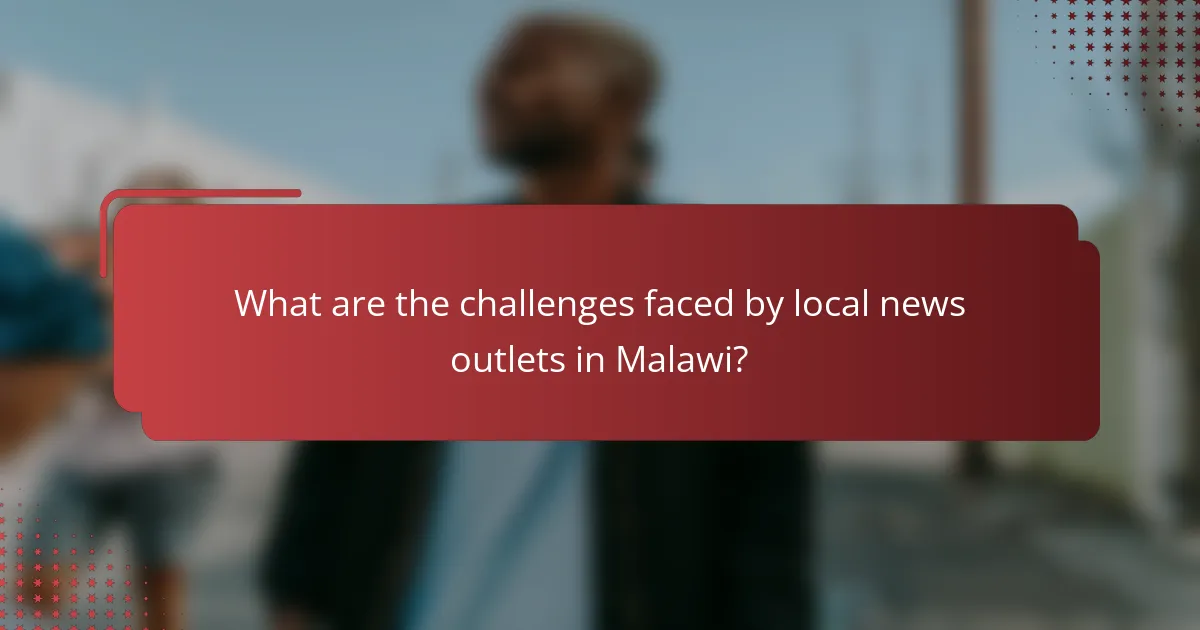Local news in Malawi encompasses a range of topics, including political developments, economic issues, public health, and environmental concerns. Key trends indicate a focus on government actions, inflation, disease outbreaks, and the impact of climate change. Local news outlets face challenges such as limited financial resources, low advertising revenue, political pressure, and inadequate infrastructure, which affect their operational capacity. Despite these challenges, local news plays a crucial role in informing citizens, fostering community engagement, and promoting accountability, ultimately influencing civic participation and democratic processes in Malawi.

What are the current local news trends in Malawi?
Current local news trends in Malawi include a focus on political developments, economic issues, and public health. Political news often highlights government actions and elections. Economic reporting addresses inflation, agriculture, and foreign investment. Public health coverage centers on disease outbreaks and healthcare access. Additionally, environmental issues and climate change are increasingly reported. Social media plays a significant role in disseminating news. Local outlets are also adapting to digital platforms to reach broader audiences. These trends reflect the interests and concerns of Malawian citizens.
How have local news outlets evolved in Malawi?
Local news outlets in Malawi have evolved significantly over the past few decades. Initially, the media landscape was dominated by state-run newspapers and radio stations. These outlets primarily served government interests and limited public discourse. The 1990s saw a shift with the introduction of multiparty democracy. This change allowed for the emergence of private media houses.
The growth of community radio stations has also played a crucial role. These stations provide localized content and engage communities in discussions. The advent of digital technology has further transformed local news dissemination. Online platforms and social media have enabled faster news delivery and broader reach.
As of 2022, there are over 30 registered radio stations and several online news portals in Malawi. This diversification has enhanced the variety of perspectives available to the public. The evolution of local news outlets reflects a growing demand for independent journalism and accountability.
What historical factors have influenced the development of news media in Malawi?
The development of news media in Malawi has been influenced by several historical factors. Colonial rule established early forms of media, primarily to serve the interests of the British. The introduction of the first newspaper, “The Malawi Times,” in 1964 marked a significant development in local journalism. Post-independence, the government exercised tight control over media, leading to the establishment of state-run outlets. The advent of multiparty democracy in the 1990s allowed for greater media freedom. This shift led to the emergence of private newspapers and radio stations. Political events, such as the 1994 elections, spurred a vibrant media landscape. Additionally, the rise of mobile technology has transformed how news is disseminated in Malawi. These historical factors collectively shaped the current state of news media in the country.
How has technology impacted local news reporting in Malawi?
Technology has significantly transformed local news reporting in Malawi. It has facilitated faster news dissemination through digital platforms. Social media has become a primary source for breaking news. Mobile technology allows journalists to report from remote areas. This accessibility has improved coverage of local issues. Online news portals have emerged, increasing competition among outlets. Digital tools enhance multimedia storytelling capabilities. These advancements have also led to greater audience engagement and interaction.
What role do major news outlets play in Malawi’s media landscape?
Major news outlets in Malawi serve as key sources of information and influence public opinion. They provide coverage of national and local events, politics, and social issues. These outlets help shape the democratic discourse by informing citizens about government actions and policies. They also hold authorities accountable by investigating and reporting on corruption and human rights violations. Major news outlets contribute to media diversity by offering various perspectives and voices. Their role is crucial in promoting transparency and fostering an informed citizenry. According to the Malawi Communications Regulatory Authority, these outlets are essential for enhancing public participation in governance.
Which are the leading news outlets in Malawi and what makes them prominent?
The leading news outlets in Malawi include Malawi Broadcasting Corporation (MBC), Nation Publications Limited (NPL), and The Daily Times. MBC is prominent for being the state broadcaster and providing comprehensive news coverage. NPL is known for its diverse publications, including The Nation, which has a strong readership. The Daily Times is recognized for its investigative journalism and in-depth reporting on current affairs. These outlets are significant for their influence on public opinion and their role in promoting democracy and accountability in Malawi.
How do these outlets influence public opinion and local governance?
Local news outlets in Malawi significantly influence public opinion and local governance. They shape narratives by providing coverage of local issues and government actions. This coverage informs citizens about policies, events, and community concerns. Research indicates that regular exposure to local news correlates with increased civic engagement. For instance, a study by the Malawi Communications Regulatory Authority found that local news influences voter behavior and community mobilization. Furthermore, these outlets serve as a platform for public discourse, allowing citizens to voice opinions and hold officials accountable. This interaction fosters transparency in governance.

What are the challenges faced by local news outlets in Malawi?
Local news outlets in Malawi face several significant challenges. Limited financial resources hinder their ability to operate effectively. Many outlets struggle with low advertising revenue due to a small market size. Additionally, political pressure can influence editorial independence. The lack of training and professional development opportunities affects journalists’ skills. Furthermore, inadequate infrastructure limits access to technology and reliable internet. These factors combined create a challenging environment for local news reporting.
How do economic factors affect local news reporting?
Economic factors significantly influence local news reporting. Limited funding can lead to reduced staff and resources. This often results in less comprehensive coverage of local issues. Advertising revenue fluctuations impact the financial viability of news outlets. When local businesses struggle, they spend less on advertising. Consequently, news organizations may prioritize sensational stories to attract viewers. Economic downturns can also lead to closures of local news outlets. In Malawi, for instance, many community newspapers have faced financial challenges. These factors collectively diminish the diversity and quality of local news reporting.
What financial constraints do local news outlets encounter?
Local news outlets encounter significant financial constraints primarily due to declining advertising revenues. Many local newspapers have seen a drop in print advertising as businesses shift to digital platforms. This transition has reduced the financial resources available to sustain operations. Additionally, local news outlets often struggle with limited subscription revenues, as fewer people are willing to pay for news content. The competition from larger media organizations further exacerbates these financial challenges. In Malawi, many local news outlets rely heavily on donor funding, which can be unpredictable and inconsistent. According to a 2021 report by the Media Institute of Southern Africa, many local news outlets in Malawi face operational challenges due to these financial constraints.
How does advertising revenue impact the sustainability of these outlets?
Advertising revenue is crucial for the sustainability of local news outlets in Malawi. It provides the primary funding necessary for operations and content production. Without sufficient advertising income, these outlets struggle to cover basic costs such as salaries, equipment, and distribution. For instance, a study by the Media Institute of Southern Africa found that many local news outlets rely on advertising for over 70% of their revenue. This heavy reliance makes them vulnerable to market fluctuations and changes in advertiser preferences. When advertising budgets shrink, it directly threatens the ability of these outlets to maintain journalistic standards and community engagement. Thus, stable advertising revenue is essential for the ongoing viability of local news in Malawi.
What are the political challenges for local news in Malawi?
Local news in Malawi faces significant political challenges. Government interference often limits journalistic freedom. Journalists encounter harassment and intimidation for reporting on sensitive topics. The legal environment can be hostile, with laws that restrict press freedom. Censorship is a common issue, particularly regarding political dissent. Economic pressures also impact local news, as funding sources can be influenced by political affiliations. These challenges hinder the ability of local news outlets to operate independently and report objectively.
How does government regulation affect local news reporting?
Government regulation significantly impacts local news reporting by influencing content, funding, and operational freedoms. Regulations can dictate what topics are covered and how they are reported. For instance, laws regarding defamation can deter journalists from investigating sensitive issues. Furthermore, government funding or subsidies can support local news outlets but may come with strings attached. In Malawi, the Media and Communications Act regulates broadcasting and imposes licensing requirements. Such regulations can limit the diversity of viewpoints presented in local news. Additionally, excessive regulation may lead to self-censorship among journalists, affecting the overall quality of reporting.
What risks do journalists face in the current political climate?
Journalists in the current political climate face significant risks, including threats to their safety and freedom. Physical violence against reporters has increased in many regions. In Malawi, for instance, journalists have been attacked while covering protests. Additionally, there are risks of legal repercussions, such as arrests for reporting on sensitive topics. Censorship and government pressure also pose threats to journalistic integrity. Economic challenges further complicate the situation, as media outlets struggle for funding. These risks hinder the ability of journalists to operate freely and report accurately.

What are the impacts of local news on Malawian society?
Local news significantly impacts Malawian society by informing citizens about local issues. It fosters community engagement and participation in governance. Local news outlets often highlight social, economic, and political matters that affect daily life. This coverage can influence public opinion and decision-making. Furthermore, local news serves as a platform for accountability, allowing citizens to voice concerns. Research indicates that increased access to local news correlates with higher civic participation rates. This relationship underscores the role of local news in promoting democracy in Malawi.
How does local news contribute to community engagement?
Local news contributes to community engagement by providing relevant information that fosters local identity. It informs residents about local events, issues, and opportunities. This localized coverage encourages public participation in community activities. According to a study by the Pew Research Center, 73% of local news consumers feel more connected to their community. Local news also serves as a platform for dialogue among residents. It highlights community challenges and successes, prompting discussions and solutions. Additionally, local news outlets often collaborate with community organizations, enhancing civic involvement. This engagement can lead to increased volunteerism and support for local initiatives.
What role does local news play in promoting civic participation?
Local news plays a crucial role in promoting civic participation by informing communities about local issues and events. It provides residents with essential information on governance, elections, and community initiatives. This access to information empowers citizens to engage in discussions and decision-making processes. Research shows that communities with strong local news outlets have higher voter turnout and participation in civic activities. For instance, a study by the Pew Research Center found that local news significantly influences civic engagement levels. By fostering a sense of community and awareness, local news encourages individuals to take action and participate in civic life.
How does local news coverage affect social issues in Malawi?
Local news coverage in Malawi significantly influences social issues by shaping public awareness and discourse. It highlights critical topics such as health, education, and governance. This coverage can mobilize community action and government response. For instance, reports on health crises can lead to increased funding and resources. Local news also holds authorities accountable, promoting transparency. Studies show that informed citizens are more likely to engage in civic activities. Therefore, local news serves as a vital tool for social change in Malawi.
What best practices can enhance local news effectiveness in Malawi?
Local news effectiveness in Malawi can be enhanced by improving community engagement and adopting digital platforms. Engaging local communities fosters trust and relevance in news reporting. This can be achieved through town hall meetings and social media interactions. Utilizing digital platforms expands reach and accessibility, especially among younger audiences. Training journalists in multimedia storytelling enhances content quality. Collaborating with local organizations can provide diverse perspectives and resources. Implementing feedback mechanisms allows for audience input, improving content alignment with community needs. These practices contribute to a more informed and engaged citizenry, ultimately strengthening local journalism.
How can local news outlets improve their audience reach and engagement?
Local news outlets can improve their audience reach and engagement by leveraging digital platforms and social media. Utilizing social media channels increases visibility and allows for real-time interaction with audiences. Engaging content, such as videos and live streams, captures attention effectively. Collaborating with local influencers can also expand reach to new demographics. Additionally, tailoring content to reflect community interests fosters a stronger connection with the audience. Research indicates that local news outlets that actively engage with their communities see higher audience loyalty. A study by the Pew Research Center found that 49% of local news consumers prefer news that focuses on local issues.
What strategies can be implemented to ensure journalistic integrity in local news reporting?
Implementing strategies for journalistic integrity in local news reporting involves several key practices. First, establishing a strict code of ethics is essential. This code should guide reporters on issues like accuracy, fairness, and accountability. Second, regular training sessions for journalists can enhance their understanding of ethical standards. These sessions can cover topics such as fact-checking and bias recognition.
Third, fostering transparency is crucial. News outlets should disclose their sources and funding to build trust with the audience. Fourth, promoting diverse voices in reporting can counteract bias. This includes representing various community perspectives. Fifth, encouraging community engagement can enhance accountability. Feedback from local audiences can help identify potential issues in reporting.
Lastly, implementing a robust editorial review process can ensure content accuracy before publication. This process should involve multiple layers of review to catch errors. These strategies collectively contribute to maintaining high journalistic standards in local news reporting.
The main entity of this article is local news trends in Malawi, focusing on the evolution and impact of major news outlets. It covers current trends in political, economic, and public health reporting, as well as the role of technology and social media in news dissemination. The article discusses historical factors influencing media development, the challenges faced by local outlets, and their significance in promoting civic engagement and accountability. Additionally, it highlights best practices for enhancing journalistic integrity and audience engagement in the Malawian media landscape.




